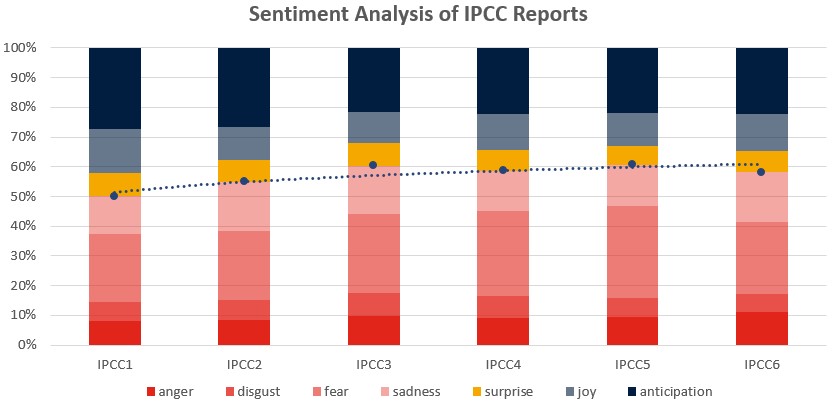
How you deliver the message matters in the world of climate reporting
An analysis of the tone of voice of the six IPCC Reports

When the Intergovernmental Panel on Climate Change (IPCC) said on 20 March 2023 that humanity had its ‘final warning’ to act on climate change, did the message land as intended and was it their tone of voice that gave a lie to the message being reported?
The projections make it very clear that man-made climate change is a scientific certainty, and since the original IPCC report in 1990, our ability to capture and understand climate data has improved significantly, giving a clearer picture than ever of the impending irreversibility of climate change. What is less clear to readers of these highly technical reports is whether the language used is sufficiently aligned to the urgency of the situation.
Our analysis of the report shows that the IPCC may not convey its story with an appropriate narrative voice clearly enough. While the reports are intended for a technical audience, they are read by policymakers globally, who in many cases will be focused on the style of messaging. Therefore, we question whether the tone of voice makes it sufficiently clear that the time to act is running out.
The analysis
For the analysis we used the full text from each of the six IPCC reports and analysed the sentiments implied by the narrative on a word-by-word basis in order to create an overall picture of how ‘angry’ or ‘joyful’ the documents are. The text of the reports was evaluated against the NRC Emotion Lexicon, a list of English words with attached crowd-sourced emotions, which was adjusted to make the emotions dataset more relevant to climate change. We then split the results into:
- positive emotions (blue)
- negative emotions (red)
- neutral emotions (amber).
A trend line showing the change in share of words expressing a negative sentiment across the six reports is also show.

This analysis suggests that, while the technical analysis from the sixth IPCC report makes it very clear that the situation is dire, the narrative message is much less coherent, a significant proportion of the words implying joy or anticipation. While some positive emotions are to be expected from the report’s findings on climate action, the overarching message is that this is too little and very nearly too late, yet the narrative sentiment reflects more hope. Since the third IPCC report in 2001, there has been little change in the tone of voice, and while to some extent the situation was clear in 2001, repeating the same messages in 2023 may be somewhat ineffective.
Even the most experienced author can forget to step back and look at the overarching narrative they are conveying to their readership when close to the technical detail of a report.
As organisations look to publish their latest round of climate reports, this should be at the forefront of their minds. A fresh set of eyes reading the draft reports cover-to-cover can provide assurance that the subtle emotional-level messages are appropriate and accurately reflect the work organisations are doing.
Limitations
While we made adjustments to ensure the emotions dataset is more appropriate for climate change, there are always limitations to sentiment analysis which struggles to recognise sarcasm (not commonly used in scientific reports) and how the meanings of words change when combining them. For example, the words below were allocated to the following emotions:
- confident: joy, trust
- exceed: joy, anticipation
- resources: joy, positive, trust.
However, this example sentence clearly conveys a strong negative sentiment – we are confident that at current rates of consumption we will exceed the planet’s available resources.
To take this exercise a step further, we could conduct a more detailed analysis using natural language processing (NLP) techniques to determine more robustly the meaning of each sentence and further analyse the emotions implied by the narrative.
How Crowe can help
We are helping our clients unlock the value of data through the innovative and practical application of governance, technology and analytics. Please get in touch with your usual Crowe contact for more information.
Insights




